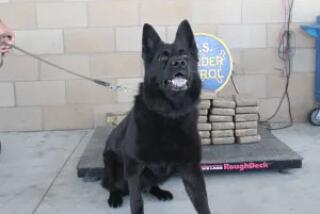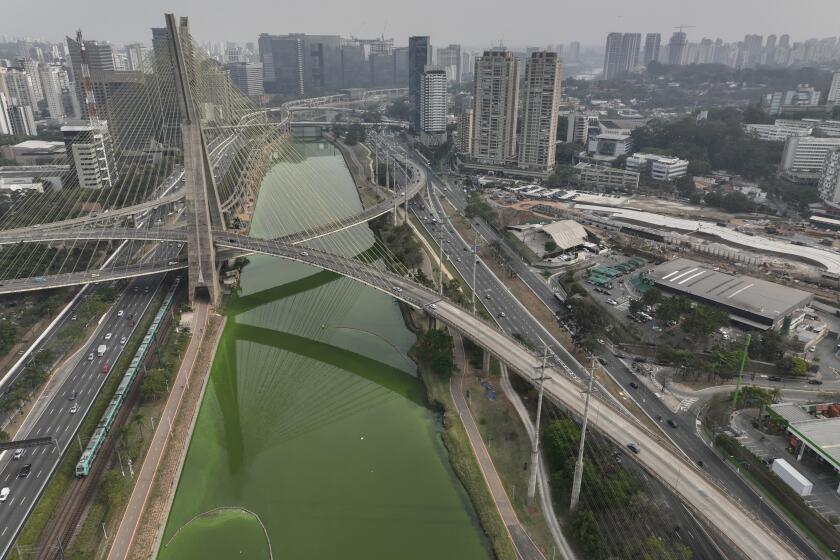Border Patrol Run-In Left Him in Hospital, Russian Immigrant Says
Boris Shapovalov was driving to his job in Anaheim last Friday when he was pulled over at the Border Patrol checkpoint in San Clemente. Shapovalov, a Russian immigrant who became a U.S. citizen about 10 years ago, was asked for identification.
He offered his automobile club card. While that might have helped him get a tow, the Border Patrol officer told him that wasn’t good enough, Shapovalov said, so he handed over his driver’s license.
As Shapovalov, 51, tells it, instead of being sent on his way, he ended up in the hospital with a broken hip socket, a dislocated hip, lung damage and cuts and bruises after Border Patrol agents beat him up.
No agents have been charged.
“I don’t feel so bad,” Shapovalov said Thursday from his hospital bed. “The only complaint I have is that people shouldn’t be allowed to treat each other this way.”
Border Patrol officials declined comment, saying the incident is under investigation.
Shapovalov said he plans to sue.
Shapovalov, who works as a computer programmer at Digital Graphic Advantage, said he has made the drive from his home in Oceanside to Orange County for the last nine years. His wife is a professor at San Diego State University.
Each day he drives through the Border Patrol checkpoint on the San Diego Freeway. He said Border Patrol agents have pulled him over for questions on two or three occasions.
This time, Shapovalov mistakenly drove his 1992 gray Toyota Corolla into the far left lane. The lane is reserved for a pilot program for commuters who have undergone background checks and who have a sticker with a bar code on their cars that allows them to pass through.
Nearly 20% of the people who drive into that lane do so mistakenly, said Janna Evans, a community relations officer for the Border Patrol.
When that happens, the car is pulled over to the side, which is what happened to Shapovalov.
The computer programmer said the agent told him something about a sticker, but Shapovalov had no idea what he was talking about. He was asked routine questions about where he was born and if he was naturalized. Then he was asked to step outside and place his hands on the car, he said.
Other officers started to shout, “On the ground,” Shapovalov recalled.
Because he is 5 feet 8 inches, 235 pounds--”I’m fat”-- and recently had had nose surgery, Shapovalov said he asked if he could sit on bench a few feet away.
At that point, he said, the officers knocked him to the ground. “I fell down headfirst. I lost consciousness for a moment,” he said in his accented English. “Somebody was sitting on my back, and I was trying to tell them I was short of breath.”
Sometime during the encounter, Shapovalov thinks he blacked out. He says his face was bloodied.
A Border Patrol agent stuck his knee in Shapovalov’s back and finally cuffed him, he said.
According to Shapovalov, the agents sat him on the bench and continued questioning him. One agent, he said, was shouting at him in Spanish until someone else told him the handcuffed man was Russian.
They brought in a dog to check his car for drugs, and unlocked his trunk.
“Every time I have a chance, I’m asking them for a chance to touch my side because it hurts badly,” he said. “Nobody pays attention.”
About two hours later, he said, an ambulance took him to the hospital in San Clemente. At that point, he said, two Border Patrol agents were waiting for him, and they handcuffed him to a stretcher.
“What is probably most disturbing about this incident is the Border Patrol still has not brought any charges,” said Shapovalov’s attorney, Kerry Steigerwalt.
Roberto Martinez, director of Border Project for American Friends Service Committee, said incidents such as the one Shapovalov described, are “all too common. It’s very widespread.”
Shapovalov said it will be six months before he returns to work.
“In the U.S.S.R., I knew the police could be brutal, so I tried to avoid them,” Shapovalov said. “That’s one of the reasons I left the stupid country.”
More to Read
Sign up for Essential California
The most important California stories and recommendations in your inbox every morning.
You may occasionally receive promotional content from the Los Angeles Times.











